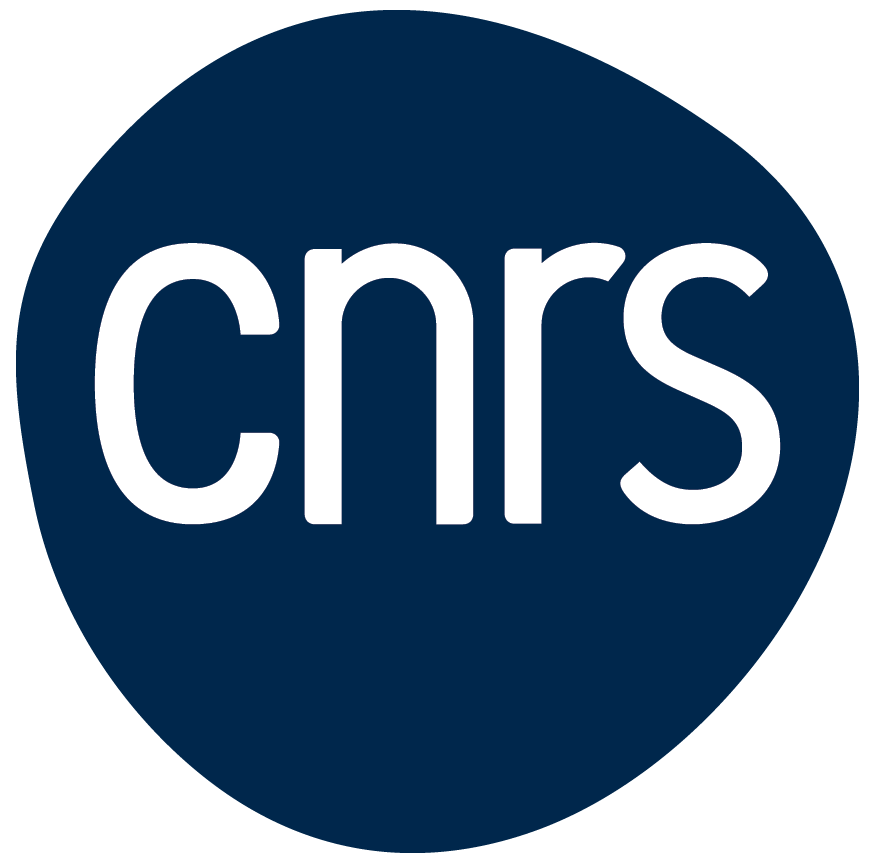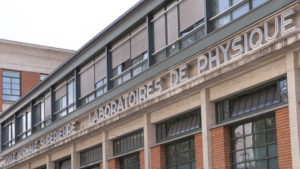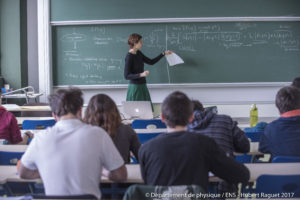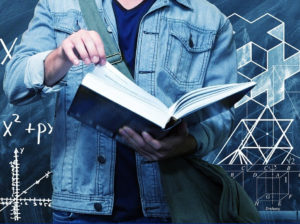Technical and technological services
The technical and technological services of LPENS are an integral part of the technical and technological platforms of the physics department of the ENS, which brings together the technical staff of LPENS and the Laboratoire Kastler Brossel (LKB).
These platforms are composed of :
- 4 design offices: mechanics, electronics, instrumental development, optics and instrumentation
- 2 workshops: mechanics (mechanical manufacturing, welding, glassware) and electronics
- 1 micro and nano-manufacturing platform (clean room)
- 1 biophysics platform
- 5 services: cryogenics, information technology, infrastructure and shop, electricity, and maintenance.
Design office
Parts are designed and manufactured in close collaboration with the laboratory in order to meet the demands of researchers. In order to meet these needs, advanced skills are developed in the fields of design, manufacturing and welding.
Design office – Mechanics
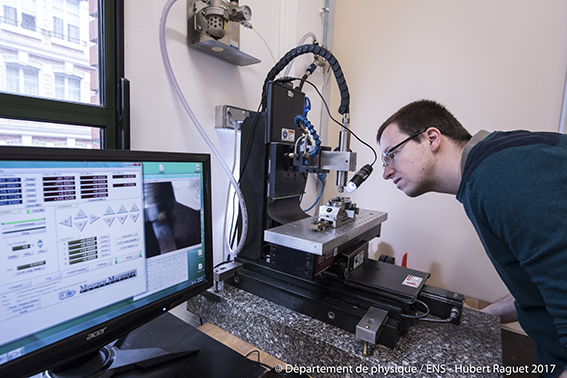
The design office is equipped with 4 local Catia V5 licenses, 7 server licenses and 1 Comsol license.
Design office – Electronics
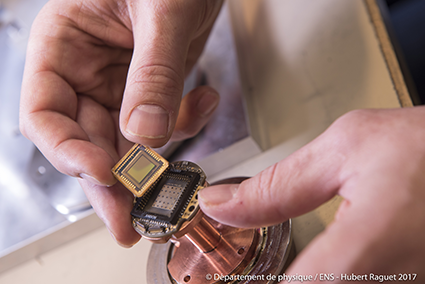
In close relationship with the research teams and the various technical services of the Laboratory and the Physics Department, the members of the Electronics Design Office develop and implement innovative systems in all fields of analog and digital electronics. They take part in the elaboration of the specifications involving the different choices and technical orientations necessary to the definition of the electronic system and finally its final integration on the scientific experimentation.
A continuous technological watch allows to bring a response always at the forefront by using the most appropriate technologies.
Several projects have already aroused interest beyond the LPENS, giving rise to collaborations and development through industrialization and/or patents.
Design office – Instrumental development
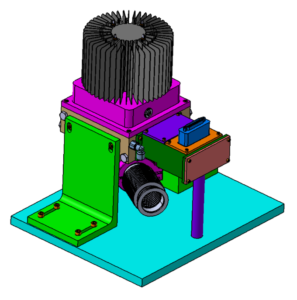
The complementarity of the members of the department (a technician, an assistant engineer and a design engineer) allows us to respond to many requests and we regularly collaborate with the electronics design office and the mechanical manufacturing platform.
Design office – Optics
En construction
Mechanics
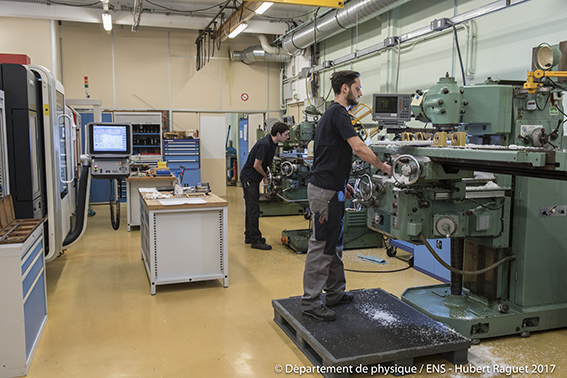
The workshop’s equipment includes several numerically controlled machining centres and a number of conventional machine tools including lathes, drilling machines, etc. Its latest generation 3D printers are used throughout the department.
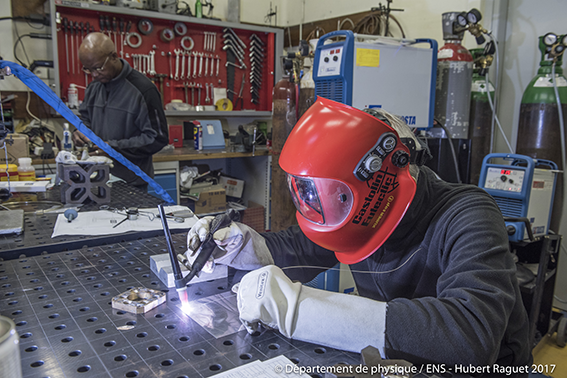
Electronics
These activities, mainly oriented towards electronics associated with laser instruments and the acquisition of optical signals use skills and implements know-how in different fields:
– low-noise electronics,
– power electronics,
– high voltage,
– frequency synthesis,
– radio frequencies
– data acquisition,
– the control command,
– programmable logic
– servo systems
The tandem formed with the design office accompanies the research teams from the drafting of the specifications to the commissioning of the instrument, including analysis, study and simulation.
All the experimental devices are carried out in close collaboration with the researchers.
Clean room, materials
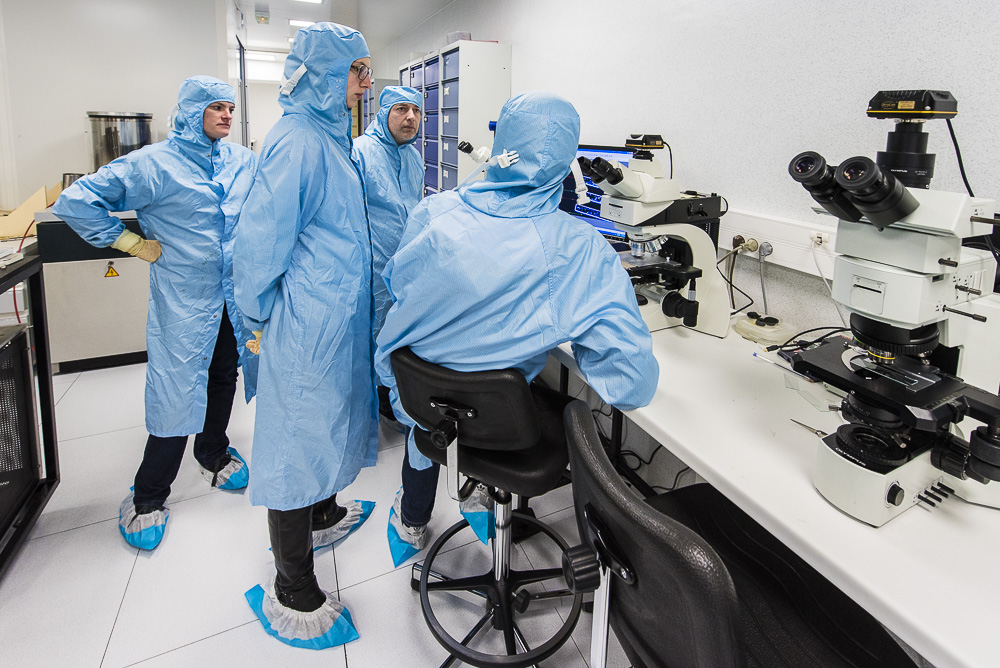
The clean room (140 m², ISO7), is an infrastructure, located in the first basement of the building (LS178), which brings together all the equipment dedicated to the growth, structuring and characterization of matter on micro and nanometric scales.
These technologies are, after a training period, accessible to all members of the laboratory, and are organized into four poles: lithography, transfer, growth and characterization. More informations on the dedicated page.
Member of the CNRS consortium
The clean room of the Physics Department is also a member of the “Centrale de Proximité Paris Centre”, a consortium that brings together and mutualises the technological offer for micro-nano fabrication of five Parisian research institutes: including, in addition to the ENS, the Materials and Quantum Phenomena Laboratory (MPQ, Université Paris Diderot), the Institute of NanoSciences of Paris (INSP, Sorbonne University), the Paris Observatory and the Pierre-Gilles de Gennes Institute (IPGG). All members of the consortium have access to all the clean rooms of this network.
Biophysics
The Biology Platform of the ENS Physics Department is a biology laboratory that provides technological resources, skills and expertise in the field of biology to all physicists in the ENS Physics Department.
In 2009, this biology laboratory (initially given to physicists in 1995) became a real platform, both in its concept and operation, open to researchers and students, mainly biophysicists in the physics department, in order to design and produce the biological objects necessary for their projects.
Thus, the available technological resources allow production and manipulation of nucleic acid molecules (RNA and DNA) and recombinant proteins, establishement and maintenance of pro- and eukaryotic cell lines, as well as the design and maintenance of transgenic animals (fish, mice). These same resources allow the analytical monitoring of biological objects produced by molecular, genomic and biochemical analyses.
The projects developed on the platform can be developed autonomously or assisted by the responsible engineer in a collaborative way.
The platform is also a training centre for biophysical researchers and students, as well as for the realization of internships leading to diplomas such as BTS/DUT and Master.
The 50 m2 biology platform is located at the ENS Biology Institute (IBENS) of the ENS Biology Department and associated with the Functional Genomics Section. So, the platform users benefit from the section’s infrastructures (cell culture laboratories, medium-heavy equipment, stores, etc.) and to have access to IBENS technology platforms (high throughput genomic analyses, imaging, bioinformatics, proteins and animal facilities), as well as to develop interdisciplinary collaborations with the various IBENS teams.
The available equipment is:
– 1 PCR hood
– 1 chemical hood
– 1 chemical cabinet
– 1 PSM hood
– 1 AktaTM semi-preparatory HPLC unit and 1 refrigerated cabinet
– 2 thermal cyclers
– 4 electrophoresis equipment
– 13 storage facilities
– 4 refrigerators
– 8 freezers at -20°C
– 1 freezer at -80°C
– 2 PCS
ENS high throughput qPCR platform website : https://qpcr.cnrs.fr/
Cryogenics
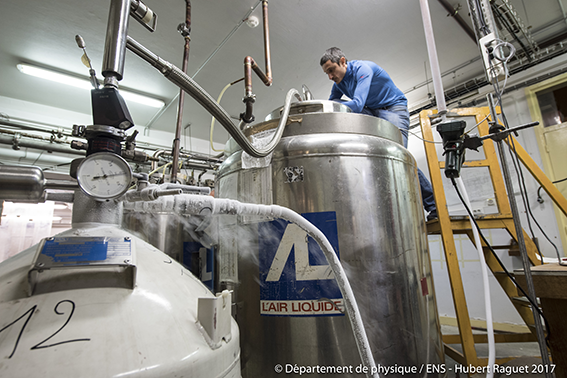
Each year, the platform supplies research teams with approximately 150,000 liters of nitrogen and 75,000 liters of helium. Due to the low cost of liquid nitrogen (10 centimes per liter) and its inexhaustible nature, it is self-service. A tank filled regularly by an external service provider allows researchers to be permanently supplied with liquid nitrogen.
On the other hand, in order to reduce the operating costs associated with the use of liquid helium, which is 100 times more expensive than nitrogen, the service is equipped with a liquefier. The helium from the evaporation of some twenty cryostats will be collected in a gasometer before being stored in high-pressure cylinders. This includes the cryostats of the Collège de France, which are physically connected to the Ens by a long pipe installed in the Paris sewers. This is how the helium liquefier is fed continuously. For half of the experimenters working in the physics department, helium conditions the quality and sustainability of research.
This closed-circuit operation makes it possible to recycle up to 85% of the helium used in the various laboratories. This ensures an almost permanent availability and a supply at the best price. In these times of climate change and soil depletion, this so-called “noble” resource, which is becoming increasingly scarce, can also be saved.
IT
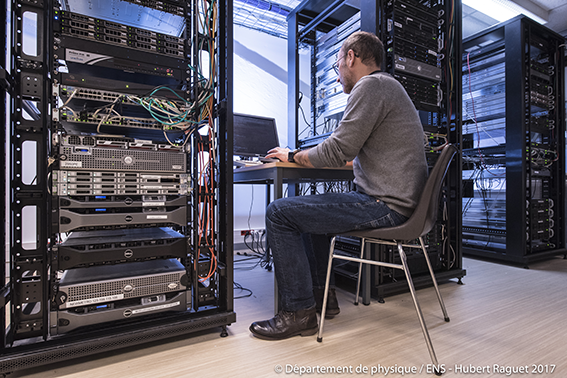
The IT department maintains, supervises and maintains nearly 800 machines which include computers for research or administrative staff, “manip” computers, servers (mail, web, etc.), scientific computing servers and network equipment.
The department interacts on a daily basis with experimenters on data acquisition and storage issues, with theorists on scientific computing issues and with administrative or technical staff for the general maintenance of the computer park.
Any connection to the network must be accompanied by the opening of an account and must be validated by the IT department.
The purchase of computer equipment must also be validated by the IT department. To open a computer account, please contact the manager of your structure.> Practical information (internal access)
LPENS INTRANET
DEPARTMENTAL INTRANET
The physics department Intranet is only accessible from the department network, you have to click on the Intranet tab at the bottom of the page of the department’s website : www.phys.ens.fr
To consult the Intranet from your home or from another site, you will have to get in touch with the IT department (setting up a proxy).
INTRANET OF THE
Access the Ens Intranet: “Intranet” tab accessible at the bottom of the www.ens.fr website.
To access the Ens’s digital workspace, a login and password must be requested from the CRI (Computer Resource Centre): assistance-cri@ens.fr.
Infrastructures, shops
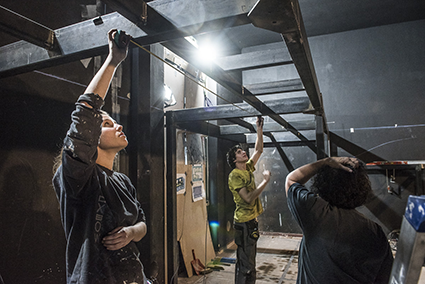
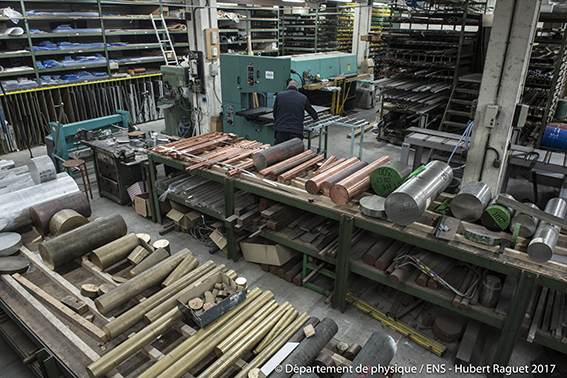
An electronics store and a materials store are associated with this service.
Electricity
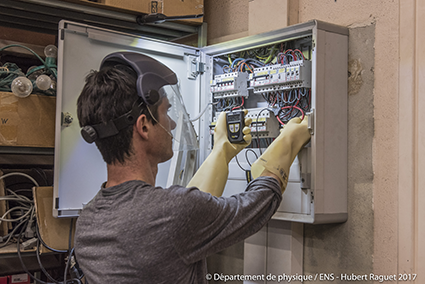
Supply: PC blocks (extension), terminal strips (domino), terminals, various plugs, bulbs, wires, cables…

